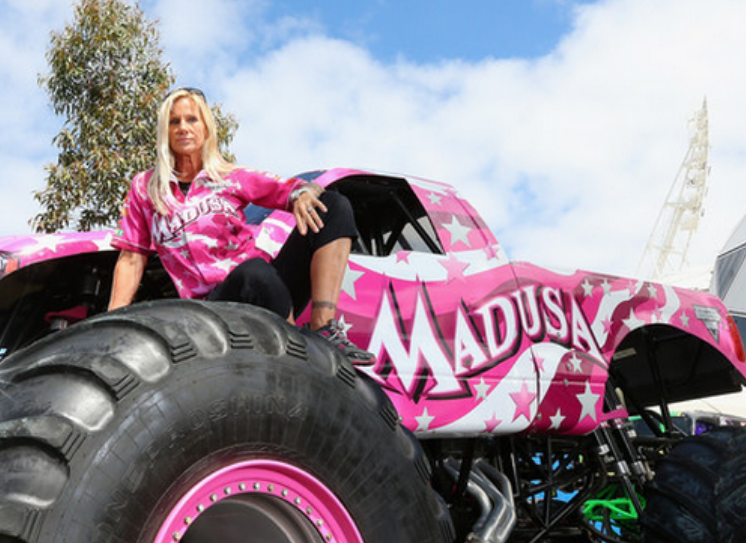
zimbio.com
Visibility and respect, held with tired arms in a dire double headlock—this is the struggle of women in sports. And sometimes you have to let go of one, just to maintain your footing, just to keep the bills —and it’s hard to know which.
Interest in women’s sports is fleeting and conditional at best, and it can come down to burning a bridge or burning out.
On December 18 1995, Debra Miceli, the wrestler once known as Alundra Blayze (who had valiantly defended American pride against foreign femme fatales like Bull Nakano and Rhonda Sing) appeared on WCW's (World Championship Wrestling) Monday Night Nitro show (her direct rival) and not-so-wordlessly dropped the WWF Women’s Championship into a garbage can.
“Now this is where the big girls play!” This stunt, reckoned to now be a milestone of the Monday Night Nitro (the name given to the public rivalry between the rival wrestling shows), brought a “oh shit she did not” visibility to Miceli, now Madusa’s, career.
She helped establish a women’s championship in WCW, competed for the WCW Heavyweight Championship (against men), and even won the WCW Cruiserweight Championship (from a man), a first for the “fairer sex” of wrestling. Throwing her past away, literally, helped make Madusa the most successful and popular women’s wrestler in America.
Just don’t tell Bull Nakano.
Madusa’s visibility came at a cost—but not one she had to pay incidentally. In the wake of Madusa's birth, the WWF (now WWE) all but eschewed women’s wrestling. They did not like egg on their faces, Sam I Am.
They didn’t re-establish a title for women to compete for until 1998, eventually dropping the word “Women’s” in favor of “Divas.”
The thing with letting go of respectability, however, is that no one is going to fall over themselves to catch it for you. WWE, now an immense multimedia franchise with its own TV channels, is openly derided for its under-promoted, under-trained women’s division that emphasizes reality show appearances over in-ring performance—an active dislike of female talent that they bitterly cling to because they were burned by some woman.
And they say wrestling isn’t “real.”
Some women have, undeservedly, had to “pay” for Madusa’s visibility while others are now able to indulge in the dividends. (Did I use that term right? Why don’t we have a financial writer?)
Moving on to Monster Trucks
In 2004 Madusa upped the ante and appeared in her own self-branded monster truck as part of Monster Jam. She’s since become a two-time World Champion, a title each in racing and freestyle.
Monster trucks, as we’ve come to know them, started with Bigfoot in 1979. Bob Chandler, some guy who owned a 4x4 auto parts shop, overheard an army plot to introduce “four wheel steering”—a truck that could be steered by either the front or rear axle and thus be a little harder to render inoperable; he created the first 4x4x4 (four wheels, four wheel drive, and four wheel steering).
To showcase his new invention, Chandler drove over a couple of run-down cars as a gag. Little did he know that America had been long under the spell of a fever they couldn't name, and by filming himself crushing those cars, he stumbled upon just the poultice for our penchant for destruction: ”Oh my god I want to see those cars crushed. I like cars a lot but I also need to see some destroyed by a giant truck and I will pay money for this.”
By 1984 a new genre of motorsports was in full swing. In 1988, it became legitimate with the formation of the Monster Truck Racing Association. Like wrestling, monster trucks dabble in a little character-building now and again. Notable gimmicks include Grave Digger, Cyborg and El Toro Loco. There was even a TV show, Monster Wars, where anthropomorphic “mascots” of the trucks engaged in trash talk in between races. This bothered a lot of people in the industry who wish for pro wrestling to remain the weird cousin of the family nobody talks to.
Madusa’s career change is not so strange a juxtaposition or evolution as it goes—pro wrestling and motorsports have a common ancestor in the county fairs and working class people that make up the core of their fanbases.
Since Miceli’s entry in the sport, women have become an increasingly visible fixture (which was the intent of Monster Jam in offering her a job). In 2011 Nicole Johnson, an ex-rock crawler, broke the record for most wins by a rookie driver with nine victories in a span of ten weeks. In 2013, Rosalee Ramer, a 16-year-old prodigy who hopes to study at MIT, became the nation’s youngest female driver, and a good one to boot, easily rolling over male veterans.
Between the three of them, respectability and visibility are kept in their proper places, with grace.
Misogyny in motorsports is real as Madrid. (Cue the old white man comments about female open-wheel racer Danica Patrick.) It’s really just an inversion of the “well men are just better at science because they’re more rational” rhetoric: men are just better at stuff that’s mechanical and does damage because women are emotional and afraid and don’t “have guts”.
And like wrestling, women in motorsports face an uphill struggle in getting even the faintest recognition for their work because the actual “sportiness” of motorsports is hotly debated amongst people who think baseball is neat and have no grasp of the immense physical strain that goes into driving a machine that can go hundreds of miles an hour and crush your family’s car.
This, regrettably, turns out to be a lot of people.
Wherever there is classism and derision of Southern culture, there is unchecked misogyny.
Miceli was chosen to drive the 10th iteration of Bigfoot, the original Monster Truck, in 2006. She was the only female driver in the 2005 Motorsports World Series. Her Madusa truck, in its garish bright pink, repeats the spirit of the original television stunt that made her famous, throwing misogynist dismissal into the garbage can—a big, bright pink garbage can with “screw you, I’m the greatest woman at whatever I do” written on it.
Sometimes you need to let go of respect—if only to clothesline it back on its ass.







